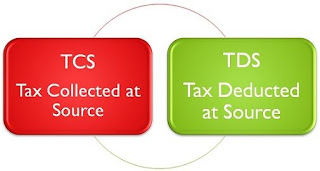Understanding the Difference Between TDS and TCS,
Under the concept of Income tax, the total income of an assessee for the previous year is taxable in the assessment year. The government’s primary source of income comes through income tax that is levied on the citizens of India. It can be done through TDS and TCS. in this article we shall understand the concept of tax deducted at source and tax collected at source as they are not the same.
TDS and TCS- Brief Overview
TCS or Tax Collection at Source and TDS or Tax Deducted at Source refers to obligation that is deducted at the istace of payment or received and deposited to the Income Tax Department. Both of them have certain key differences.
TDS-
TDS is an indirect way of receiving one’s tax where the revenue is collected directly at the recipient’s income. According to the income tax act, 1961, any payment on a particular expense falling under the purview of TDS should be settled after deducting the designated %.
In simple words, TDS means that at the time of making payment, the payer reserved some amount which has to be deposited with the government. In this way, income tax through TDS is levied in advance, and the recipient gets the net amount. Examples of TDS applicability include casual income, salary, payment of fees, payment of brokerage/commission etc.
TCS-
Whenever a particular item is sold in India, some amount is collected as tax by the company at prescribed rates from the buyer or from the payer of such amount. This is called Tax collected at source or TCS. The seller has to transfer such an amount to the government and alo issue a TCS certificate. Such items include jeweler, liquor, Bullion etc. the TCS computation rate may vary for different items.
Difference Between TDS and TCS
The difference between two is discussed in the below table-
PARAMETERS
TDS/TAX DEDUCTED AT SOURCE
TCS/TAX COLLECTED AT SOURCE
Meaning
An amount that is deducted from the income of the recipient in the form of tax.
An amount that is collected by the company or seller as tax.
Nature
It is an expense.
It is an income.
Applicability
It is imposed when payment is made above a certain limit.
It is imposed on sale of a particular item or goods.
Person responsible for deduction and collection
It is deducted by the payer.
It is collected by the seller or payee.
Occurrence
TDS is credited to the payee's account or during payment, whichever is earlier, but in case of life insurance premium and during salary payment, it is deducted at the time of making payment.
TCS is debited from buyer or during receipt, but when jewellery or bullion is sold, TCS has to be collected when consideration is obtained in cash.
What will happen if one fails to pay the TDS or TCS?
In case one fails to pay or deposit tax amount then he will have to face legal consequences. Such consequences include a penalty equal to the tax that has not been collected or deducted. Moreover the individual can also face imprisonment along with the payment of a fine as prescribed.
Interest can also be charged in case of failure to deposit TDS or TCS. the interest should be paid on monthly tax amount. For each month from the date, tax shall be eligible for deductions, interest would be calculated until the date it is deducted finally or paid off.
Conclusion
The government collects both direct and indirect taxes to generate revenue. TDS and TCS are two of the taxes that are levied on the individuals. TDS is an amount that is deducted from the income of the recipient in the form of tax whereas TCS is an amount that is collected by a company or seller as tax. Investment plan or LIC can help an individual in reducing tax burden.



Comments
Post a Comment